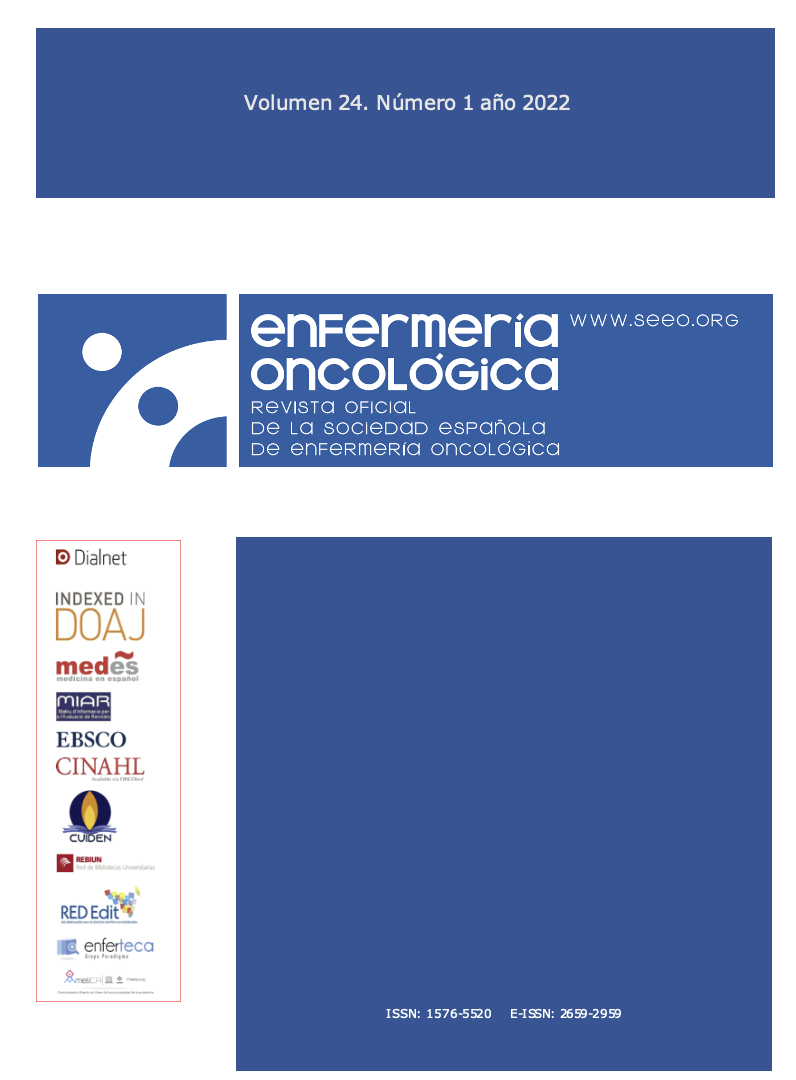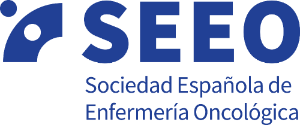EFECTIVIDAD DE UNA INTERVENCIÓN EDUCATIVA PARA LA PREVENCIÓN DEL CÁNCER DE MAMA MEDIANTE UNA WEB-APP
DOI:
https://doi.org/10.37395.SEEO2022.18Palabras clave:
Neoplasia de la mama, autoexamen de mamas, educación del paciente, prevención y controlResumen
Introducción: se estima que 1 de cada 8 mujeres tiene riesgo de desarrollar cáncer de mama a lo largo de su vida, por lo que, detectarlo de forma precoz es de suma importancia. Además, la mayoría de los tumores de mama son autodetectables por lo que se hace necesario educar y concienciar a las mujeres en una mayor responsabilización de su salud.
Objetivo: evaluar la eficacia de una intervención educativa desarrollada a través de una web-app, y basada en el modelo Behaviour Change Wheel, para mejorar el conocimiento y la adherencia a la autoexploración mamaria de forma rutinaria entre las mujeres sin diagnóstico de cáncer de mama en el Principado de Asturias, así como, a otras conductas saludables.
Método: estudio experimental, no aleatorizado, simple ciego, del tipo “grupo control sin tratamiento” llevado a cabo entre noviembre de 2019 y junio de 2020. La muestra final quedó constituida por 260 mujeres, distribuidas en grupo control (GC) y grupo intervención (GI). Las mujeres del GI participaron a través de una web-app en una intervención educativa, mientras que, las del GC no recibieron ningún tipo de intervención. Los análisis se realizaron empleando el programa informático SPSS, considerando que los resultados fueron estadísticamente significativos cuando el valor de p fue ≤ 0,05.
Resultados: Tras la intervención, el 26,3% de las mujeres del GI sabían desarrollar correctamente la autoexploración mamaria y, el 79,8% percibían que su conocimiento era el adecuado, diferencia muy significativa (p<0,001) con respecto a las mujeres del GC (53,0%). El 37,3% de las mujeres del GC y el 41,4% de las mujeres del GI realizaban mensualmente la autoexploración mamaria tras la intervención, diferencia muy significativa con respecto a la fase pre-intervención.
Discusión: investigaciones previas concluyen en que la mayoría de las mujeres no realizan la autoexploración mamaria regularmente por falta de conocimientos como motivo principal. Según un estudio realizado por Yépez-Ramírez et al, las mujeres que reciben instrucciones son capaces a posteriori de identificar precozmente cambios en su pecho en un 80-85%.
Conclusión: La intervención educativa basada en el modelo Behaviour Change Wheel y, desarrollada a través de una web-app, ha resultado ser efectiva en mujeres sin diagnóstico previo de cáncer de mama para incrementar el nivel de conocimientos sobre la autoexploración mamaria, así como, la adherencia a realizar dicha técnica mensualmente.
Palabras clave: neoplasia de la mama, autoexamen de mamas, educación del paciente, prevención y control.
Descargas
Citas
Sociedad Española de Oncología Médica. Las cifras del cáncer en España 2021 [Internet]. Madrid; 2021 [acceso 15 febrero 2021]. Disponible en: https://seom.org/images/Cifras_del_cancer_en_Espnaha_2021.pdf
International Agency for Research on Cancer. Spain 2020 [Internet]. Ginebra: Organización Mundial de la Salud; 2021 [acceso 15 febrero 2021]. Disponible en: https://gco.iarc.fr/today/data/factsheets/populations/724-spain-fact-sheets.pdf
Akpinar YY, Baykan Z, Naçar M, Gün I, Çetinkaya F. Knowledge, attitude about breast cancer and practice of breast cancer screening among female health care professionals: a study from Turkey. Asian Pac J Cancer Prev. 2011; 12(11): 3063– 8.
Alameer A, Mahfouz MS, Alamir Y, Ali N, Darraj A. Effect of Health Education on Female Teachers’ Knowledge and Practices Regarding Early Breast Cancer Detection and Screening in the Jazan Area: a Quasi-Experimental Study. J Cancer Educ. 2019; 34(5): 865–70. doi: 10.1007/s13187-018-1386-9.
Saei Ghare Naz M, Simbar M, Rashidi Fakari F, Ghasemi V. Effects of model-based interventions on breast cancer screening behavior of women: a systematic review. Asian Pac J Cancer Prev. 2018; 19(8): 2031–41. doi: 10.22034/APJCP.2018.19.8.2031.
Haghighi F, Hoseini SM, Eshaghi S, Naseh G, Tavakoli MR. The effects of education on breast self-examination knowledge, attitude, and practice among the female employees of Birjand University. Mod Care J. 2015; 12(1): 47–53.
El-Hay SAA, Mohamed NS. Effect of educational program about breast cancer knowledge and breast self-examination training on building accurate information and behavior among women. J Nat Sci Res. 2015; 5(4): 58–70.
Aghamolaei T, Hasani L, Tavafian SS, Zare S. Improving breast self-examination: An educational intervention based on health belief model. Iran J Cancer Prev. 2011; 4(2): 82–7.
Yurdakos K, Gulhan YB, Unalan D, Ozturk A. Knowledge, attitudes and behaviour of women working in government hospitals regarding breast self examination. Asian Pac J Cancer Prev. 2013; 14(8): 4829–34. doi: 10.7314/apjcp.2013.14.8.4829.
Esfahani MS, Taleghani F, Noroozi M, Tabatabaeian M. An educational intervention on based information, motivation and behavior skills model and predicting breast self-examination. J Prev Med Hyg. 2018; 59(4): E277–E281. doi: 10.15167/2421-4248/jpmh2018.59.4.796.
Nde FP, Assob JCN, Kwenti TE, Njunda AL, Tainenbe TR. Knowledge, attitude and practice of breast self-examination among female undergraduate students in the University of Buea. BMC Res Notes. 2015; 8: 43. doi: 10.1186/s13104-015-1004- 4.
Lee H, Ghebre R, Le C, Jang YJ, Sharratt M, YeeD. Mobile Phone Multilevel and Multimedia Messaging Intervention for Breast Cancer Screening: Pilot Randomized Controlled Trial. JMIR Mhealth Uhealth. 2017; 5(11): e154. doi: 10.2196/mhealth.7091.
Fanning J, Mullen SP, McAuley E. Increasing physical activity with mobile devices: a meta-analysis. J Med Internet Res. 2012; 14(6): e161. doi: 10.2196/jmir.2171.
Bowen DJ, Robbins R, Bush N, Meischke H, Ludwig A, Wooldridge J. Effects of a web-based intervention on women’s breast health behaviors. Transl Behav Med. 2017; 7(2): 309–19. doi: 10.1007/s13142-016-0439-z.
Abera H, Mengistu D, Bedaso A. Effectiveness of planned teaching intervention on knowledge and practice of breast self-examination among first year midwifery students. PLoS One. 2017; 12(9): e0184636. doi: 10.1371/journal.pone.0184636.
Dolado Martín C, Berlanga Fernández S, Massip-Salcedo M. Aplicaciones móviles de control de peso y dieta saludable, ¿todas valen? RIdEC. 2018; 11(1): 22–9.
Hong YA, Goldberg D, Ory MG, Towne SD Jr, Forjuoh SN, Kellstedt D, et al. Efficacy of a Mobile-Enabled Web App (iCanFit) in Promoting Physical Activity Among Older Cancer Survivors: A Pilot Study. JMIR Cancer. 2015; 1(1): e7. doi: 10.2196/cancer.4389.
Chung IY, Kang E, Yom CK, Kim D, Sun Y, Hwang Y, et al. Effect of short message service as a reminder on breast self-examination in breast cancer patients: a randomized controlled trial. J Telemed Telecare. 2015; 21(3): 144–50. doi: 10.1177/1357633X15571651.
Sriramatr S, Berry TR, Spence JC. An internet-based intervention for promoting and maintaining physical activity: a randomized controlled trial. Am J Health Behav. 2014; 38(3): 430–9. doi: 10.5993/ajhb.38.3.12.
Cancela-Ramos MA, Contreras-Hernández JM, Phinder-Puente M, Acevedo- Marrero A, Sanchez-Valdivieso E. Nivel de conocimiento sobre autoexploración mamaria en mujeres de 20 a 59 años de edad. Rev Med Investig. 2016; 4(1): 10– 4. doi: 10.1016/j.mei.2016.01.005
Castillo Nograro S. Potencialidad de uso de las aplicaciones móviles de salud en un grupo de población española. RqR. 2015; 3(3): 42–53.
Martín-Payo R, Papín-Cano C, Fernández-Raigada RI, Santos-Granda MI, Cuesta M, González-Méndez X. Motiva.DM2 project. A pilot behavioral intervention on diet and exercise for individuals with type 2 diabetes mellitus. Diabetes Res Clin Pract. 2021; 171: 108579. doi: 10.1016/j.diabres.2020.108579.
Fernández-Álvarez MM, Martín-Payo R, García-García R, Cuesta M, Carrasco- Santos S. A nutrition education intervention in adolescents who play soccer: The ideha-f project. Psicothema. 2020; 32(3): 359–65. doi: 10.7334/psicothema2019.394.
White MC, Kavanaugh-Lynch MMHE, Davis-Patterson S, Buermeyer N. An expanded agenda for the primary prevention of breast cancer: Charting a course for the future. Int J Environ Res Public Health. 2020; 17(3): 714. doi: 10.3390/ijerph17030714.
Pérez Zumano SE, López Romero AL, Bénitez Chavira LÁ, Sandoval Alonso L. Conocimientos y comportamientos sobre factores de riesgo de cáncer de mama en un grupo de mujeres. Enferm Univ. 2011; 8(1): 26–32.
Yépez-Ramírez D, Rosa AG, Guerrero-Albarrán C, Gómez-Martínez JM. Autoexploración mamaria: conocimiento y perspectiva en mujeres. Rev Enferm IMSS. 2012; 20(2): 79–84.
Sama CB, Dzekem B, Kehbila J, Ekabe CJ, Vofo B, Abua NL, et al. Awareness of breast cancer and breast self-examination among female undergraduate students in a higher teachers training college in Cameroon. Pan Afr Med J. 2017; 28: 91. doi: 10.11604/pamj.2017.28.91.10986.
Akhtari-Zavare M, Juni MH, Said SM, Ismail IZ, Latiff LA, Ataollahi Eshkoor S. Result of randomized control trial to increase breast health awareness among young females in Malaysia. BMC Public Health. 2016; 16: 738. doi: 10.1186/s12889-016- 3414-1.
McCarney R, Warner J, Iliffe S, Van Haselen R, Griffin M, Fisher P. The Hawthorne Effect: a randomised, controlled trial. BMC Med Res Methodol. 2007; 7:30. doi: 10.1186/1471-2288-7-30.
Michie S, van Stralen MM, West R. The behaviour change wheel: a new method for characterising and designing behaviour change interventions. Implement Science. 2011; 6: 42. doi:10.1186/1748-5908-6-42.
Descargas
Publicado
Versiones
- 2023-11-12 (2)
- 2022-10-19 (1)
Cómo citar
Número
Sección
Licencia
Derechos de autor 2022 Andrea Martínez Urquijo, Rubén Martín Payo; Lucía Arasanz Rodríguez; María del Mar Fernández Álvarez, Judit Cachero Rodríguez

Esta obra está bajo una licencia internacional Creative Commons Atribución-NoComercial-SinDerivadas 4.0.

















